At the Pleasure of the President
Military purge not a new direction, but the next step in an established direction
When a satellite falls from orbit, we only notice the sudden plummet and burn that occur when gravity finally attains just enough of the upper hand to exert itself.
Long before, an imperceptible and gradual decay began. Had we watched more closely, we would have seen the decay. There would still have been time to correct.
A few years ago, my wife and I went to a comedy club with some friends. The show was amusing. Nothing unforgettable, but good for a chuckle.
A few minutes after the intermission, a lady sitting a few rows behind us got up and stormed out. She didn’t care for a low-brow bit which strayed further into anatomical humor than she was apt to countenance.
Her hapless date traipsed along behind, mumbling to himself in a resigned tone. He offered a stranger the rest of his popcorn, which had done nothing wrong, after all, and deserved to go on being monched.
The two had spent the best part of a c-note apiece for the privilege of exposing themselves to something they could have and should have predicted would chafe their sensibilities.
Kurt Cobain wrote once “it amazes me, the will of instinct.” I’m far more amazed by its dullness.
We never stop being surprised by things that shouldn’t surprise us, many of which are self-spun.
President Trump recently fired Chairman of the Joint Chiefs (CJCS) Gen. CQ Brown, along with Chief of Naval Operations Adm. Lisa Franchetti and Air Force Vice Chief of Staff Gen. Jim Slife.
Not long after, the senior lawyers of the services and other various minions were invited to make themselves scarce.
News of the purge was met with abject shock. Which I find shocking. It’s like watching Friday the 13th and wondering why there is so much gore.
The gore, of course, is the point. Which everyone should have understood before watching, and in many cases choosing the movie.
Here’s what I will say about Gen. Brown before proposing how we can understand these events.
CQ Brown is a superior military leader. He’s brilliant, grasping strategy and tactics and everything in-between. He’s tough. Demanding. His standards are individually galactic, and set an example others work tirelessly to emulate. He’s geo-politically savvy, focused on building our strategic margin, and capable of marshaling lethality that creates sleeplessness in potential adversaries and instant but fleeting pre-mortem regret in those dumb enough to become actual enemies.
I’ve been critical of his time leading the US Air Force, during which he continued to operate the service under the pretension of problematic normality, when the truth was an urgent crisis.
But overall, I give Brown credit for being someone airmen could look up to, and for resisting obsession over superficial bullshit at a time of continued trial and overstretch for the rank and file. I cannot say the same for his successor.
Still, I raise nary a singular thread of an eyebrow at him being relieved from his role. It could be seen coming a mile away. CQ himself likely presumed it the instant the US election was called.
For those less sanguine, I’ve got good news and bad news. And they’re both the same.
The system is working exactly as designed.
Hyperventilate now if you must. Just know there is a lot more jostling to come. And for reasons I will explain, no one should be surprised now or later.
Should we lament this purge? There is an argument to be had.
On the one hand, presidents should have generals they trust. They should, arguably must, and legally are permitted to choose their teams.
Observers of our defense establishment will likely not disagree that choosing particular types of flag officers with particular pedigrees has not led us to a good place.
Different sorts of leaders are a good idea. They’ll be hard-pressed to do worse than the stodgy, hidebound, unacceptably catatonic PR-obsessed gaggle of senior officers we’ve typically found occupying positions of sacred trust critical to our protection and functioning.
However, concern about the unfolding disruption is not unreasonable. By definition, if it didn’t trigger concern, it wouldn’t be disruptive. And with disruption comes both opportunity and risk.
The country should have ultra-competent leaders running our military services. Men and women who understand as thoroughly as anyone on the planet the responsibility they expect from the commanders they organize, train, equip, and command.
War is the most complex human endeavor. Our way of life depends on being actually ready for it, deterring it by making that readiness obvious, and decisively crushing and ending anyone fool enough to test that readiness.
Trump's nominee to replace Gen. Brown is far more established as an entrepreneur and capitalist than as a senior military officer.
Retired Lt. Gen. Dan Caine never commanded a squadron — the Air Force’s entry level for command. Indeed, he’s never commanded above group level, and if confirmed, would have the least leadership experience of anyone ever to sit the position.
However, Caine’s unorthodox background is no reason to underestimate him. He does have combat time, special ops expertise, and exposure to the intelligence community. All in parallel with entrepreneurial and investment experience that are currently on-trend. He’s also a fighter pilot. Underestimate them at your peril.
Having worked in both the active and guard components, Caine no doubt carries a unique lens for decoding reform opportunities which might be missed by others who’ve spent most of their time learning to be good bureaucrats.
There are concerns about Caine’s actual qualification to be CJCS. I’m here to tell you those concerns are unfounded.
The Constitution is moot on the qualification to be CJCS, a position which didn’t exist at the time of drafting. Which means any question on this matter can only be settled by reference to laws passed by Congress.
Congress has spoken on the matter, detailing experience requirements in 10 USC 152, none of which Caine possesses.
But that same section of code gives the President authority to override requirements in the national interest, an undefined vagary. This means the requirements are suggestions. It makes presidential latitude limitless.
Nomination of a CJCS is an area of unchecked power. If the President deems Caine the right choice, then by definition he is. The Senate can decline confirmation. This rarely happens, and can’t be counted upon as a real check on presidential power.
If it concerns you that the most senior and authoritative military officer in the most powerful nation and military in the world can get the job simply because a particular President likes the cut of their jib, good. It should concern you, and should have for a long time now.
There are also reports that Dan Caine is an openly partisan MAGA Republican who has professed his willingness to “kill for” Mr. Trump.
If that concerns you, then:
Your concern of partisan military leadership is valid,
You’re at least three decades late, and
It would be good to write your elected legislators in both houses vs idling. Then call. Then email. Then fax. Then WhatsApp. Then WUPHF.
We don't want our military to become a tool in the partisan arsenal. Decades of tradition have established the axiom of military subjugation to civilian control. A corollary drawn from that axiom is that senior officers must be nonpartisan, in deed if not in heart and mind, given that civilian control + partisanship would make the military an extension of a political party.
Flag officer nonpartisanship is absolutely crucial to both defense and the civic health of the republic. So that the services are seen to defend all Americans, and so that their obedience can be safely presumed, regardless of who inhabits the Oval Office.
But it’s also critical to good order and discipline within the services, where meritocracy must remain the intent, and advancement must remain a matter of military competence and not political alignment or favoritism.
History doesn't look kindly upon militaries enveloped by partisan ideology.
The Luftwaffe never built a strategic bomber fleet. Two-engine dive bombers were built in massive numbers, giving Germany solid capacity for interdiction and psych warfare. Fighters were built to wage the Battle of Britain.
But key Allied industry remained safely beyond the combat radius of German bombers throughout WWII, providing a decisive margin that kept Allied logistical and resupply capacity growing as Germany’s was ground down by constant aerial bombardment.
This happened because the Luftwaffe had been ideologically captured.
When air planners were setting their tools for the coming war in the mid-30s, they marshaled the evidence for a persuasive case that a a heavy bomber was essential to the coming campaign. Hermann Göring, a WWI ace who’d risen to command the Luftwaffe, responded:
“The Führer does not ask me how big the bombers are, but how many there are.”
Hitler preferred the idea of terror inflicted by dive bombers in mass quantities to the systematic and lengthy wearing down of enemy industry. He was also allergic to advice that implied the coming war might be protracted, requiring an evolving strategy consisting of different combinations of power.
Persuading Hitler that victory might require more than a couple fighting seasons of blitzkrieg was considered an exercise in political suicide. Göring was in his role for his ideological alignment. So he did what was expected by his boss and remained ideologically aligned.
On the Allied side, countless contrary examples showcase military leaders not merely permitted but expected to give candid advice. While not always heeded, their inputs fed a collaborative process that produced better outcomes. Eventually, it produced victory.
Partisan ideology kills collaboration. The whole point of it is adherence to a script, in word and deed, shared by everyone in the faction. The contents of that script are determined by party leaders. Their authority is not questionable by anyone outside a typically insular and self-reinforcing circle with a minuscule radius.
And guess what: our laws are designed to produce this exact outcome.
Politicians in Uniform
We think of our senior-most generals and admirals as leaders, but it’s more accurate to think of them as politicians with some leadership duties.
As they stand, our laws expect political behavior and political approval for promotion to senior military roles. Our laws allow for partisanship as a test. In fact, you can argue that for all the rhetoric to the contrary, our laws actually contemplate and encourage such a test.
Americans, even those serving as officers in our military services, don’t commonly appreciate how politically saturated the senior military environment has become.
Promotion to 3-star and 4-star rank in our military is a totally within the presidential domain. Some senior positions are fixed in law, but most are designated by the president.
The president nominates appointees to such roles. There is no legally codified process. No steps to follow.
Unlike promotions to 2-star and below, there is no board to consider objective criteria. No limits placed on what the president and his agents may ask, measure, assess, or consider.
Since 3-star and 4-star rank is position-contingent, those in senior roles technically revert to their prior rank (almost always 2-star) when their tour in a politically appointed role is complete, unless nominated for another senior role or unless nominated by the president to retire in 3/4-star grade.
Unless President Trump nominates CQ Brown to retire as a 4-star, and this gets confirmed by the Senate, Brown will retire as a 2-star despite serving honorably as CJCS. And that is totally allowed under the law.
The only power exercised by Congress is confirmation of nominees to senior roles. The Senate has seldom refused a presidential nominee for reasons other than partisan politics, so this check only serves to inject more politics into the process.
Basically, the president can nominate anyone he wants for a senior military role, assess candidates however he likes, and apply an unlimited waiver to legitimize anyone who doesn’t possess the normalized experience and qualifications.
Many will read the above and be surprised that the president has unlimited latitude. But they shouldn’t be. The evidence of presidential fiat has been staring us in the beak for a long time.
Because handmaiden to the power to hire comes the power to fire. Senior flag officers, like cabinet officers and anyone else politically appointed, serve at the pleasure of the president.
As we’ve just seen, they can be fired at any time for any reason, or for no reason at all. The recent dismissals are not a discontinuity of our system. They’re a continuation.
For thirty years, generals have been getting marginalized, pushed aside, publicly vilified, or outright fired for nothing more or less than a lack of political compliance. Sometimes their misalignment has been notorious. Other times, merely tacit or even suspected.
Some of our most competent and effective military leaders have been cast out. And we’ve not batted an eyelash.
Air Force Chief of Staff Gen. Ron Fogleman retired from his role more than a year early in 1997. The public understanding of his decision was that he refused to support the unjustified scapegoating of Brig. Gen. Teryl Schwalier for the security failures leading to the bombing at Khobar Towers in Saudi Arabia.
But this was merely the camel-crippling straw in a long saga of misalignment over budget and policy issues that had left Fogleman on an island, feeling unable to best represent the interests of his service.
A few years later, Army Gen. Eric Shinseki told Congress the post-combat occupation of Iraq would require several hundred thousand troops. In so doing, he rendered candid military advice. He told the truth.
And in so doing, he incurred the wrath of Secretary of Defense Donald Rumsfeld, who preferred the advice of his deputy, Paul Wolfowitz, a political scientist with zero military experience.
Wolfowitz had been busily scurrying around D.C., frequenting various legislative and executive offices to manufacture consent for a different plan. One built on the fantasy of a much less smaller occupation implying a fraction of the troop strength.
Shinseki was a threat to the political lie that got us into the quagmire of Iraq. But he was too respected and credible, too protected, for Rumsfeld to fire him. Instead, his influence and voice on the joint chiefs fizzled to nothing ahead of his retirement.
This was defense malpractice with a terrible and bloody cost. Rumsfeld was never accountable for ignoring and shunning Shinseki. Never accountable for excising his most key expert on ground operations from the advisory process when his advice was most needed.
In fact, the political carnage was only getting started.
In 2007, Marine Gen. Peter Pace’s tenure as Chairman of the Joint Chiefs was cut short by politics.
Chairmen are intended to serve four years, provided the Senate re-confirms them at the two-year point. As Pace approached the two-year milestone, the Bush Administration determined that he would not be put forward for re-confirmation. The reason given by Secretary of Defense Bob Gates was that hearings would be too contentious given the political radioactivity of the Iraq counterinsurgency.
It was a cop out. Pace didn’t make the decisions that created a debacle in Iraq. He gave advice, outlined risks and costs, answered questions, and dutifully kept his individual views on operational matters quiet, allowing civilian leaders to call the shots.
Those civilian leaders knew if Pace stood confirmation hearings, he’d tell the truth, which would expose how often the best military advice had been diluted or ignored.
He therefore became a casualty of politics as we took another step down the path which continues to this day.
More steps followed.
In June 2008, Gates sacked Gen. T. Michael Moseley from his job as Chief of Staff of the Air Force.
The publicly understood reason for Moseley’s removal was a mishap involving the unauthorized transport of live nuclear warheads by an Air Force bomber. It was a gravely serious breach and an indication of previously concealed decay within the service’s nuclear community. But under normal circumstances, disciplinary action would have followed an investigation into the mishap, and almost certainly been focused far lower in the chain of command.
The real reason Moseley was fired was, you guessed it, political misalignment.
Gates wanted the Air Force to devote a magnitude more of its combat capacity to drone surveillance in support of ongoing twin counterinsurgencies. Moseley agreed this was necessary, but argued the service needed more budget to make it happen without killing critical modernization, to continue recapitalizing an aging fleet under high demand since Desert Storm, and to field enough airmen to support operations without burnout and overstretch.
Having learned from prior observation, Moseley conducted his negotiations and maneuvers behind the scenes.
But this didn’t buy him sufficient grace. Gates labeled him intransigent and took advantage of the nuke incident to push him aside.
As a matter of integrity, I want to mention that at the time, I thought the decision to relieve Moseley was correct. I presumed Gates’ narrative about the Air Force resisting the current conflicts was accurate. I also assumed, as a naive active duty officer, that if the Secretary of Defense was asking my service to do more, he was also assuring the resources necessary to meet his demand.
I was wrong.
Moseley was replaced by Gen. Norton Schwartz, who was chosen for his political pliability. He delivered. The Air Force stopped talking about airpower, exponentially expanded its direct support to ground operations, and traded strategic solvency of its fleet and workforce for short-term political approval.
Gates got his unblinking surveillance eye.
We still lost both wars. We broke the Air Force, which now has its oldest and smallest fleet ever, a 62% mission capable rate driven by maintenance understaffing and parts shortages, and is a couple thousand pilots short of the inventory to execute and advise.
Gates essentially put on a clinic in how to trade strategic sobriety for short-term political interests. But he wasn’t done putting heads on pikes yet.
Democrats who had complained about the political acumen of Gen. David Petraeus as he helped marshal support for war strategy in the Bush Administration reversed course after Barack Obama took office.
Gen. David McKiernan was relieved of his command of US forces in Afghanistan before he even had much chance to achieve alignment with the new civilian leadership. McKiernan’s supposed lack of political savvy was the main reason he was cut loose, as defense leaders sought someone as capable of schmoozing and glad-handing as carrying out a military mission.
That person was Gen. Stan McChrystal.
But it wasn’t long before he was also shown the door, his staff members having said mean words about civilian leaders while hanging out with a Rolling Stone reporter.
Neither firing had anything to do with military performance, competence, or advice. One wonders how things might have unfolded in Afghanistan had we stopped playing musical chairs and given a commander time to build continuity, momentum, relationships, and the strategic insight to deliver. And then gotten the hell out of their way.
But it wasn’t to be. And in the second Obama Administration, the spiral tightened as military leaders began imitating their political benefactors.
The Air Force struggled in the Obama years with a number of ethical and disciplinary problems. The response, in all cases, was to fire the commanders involved, regardless of their relative involvement or culpability.
After a cheating scandal at a missile base in Montana, Chief of Staff Gen. Mark Welsh fired nine unit commanders. They didn’t create the cultural rot exposed by the scandal and were as much victims as anyone in the dozen years of institutional neglect leading to the scandal. Their careers were collected as political pelts.
A sex scandal at a training base in Texas exposed a problem with the exercise of authority in power-imbalanced relationships, suggesting erosion in the training and development of non-commissioned officers. The response was to fire mid-level commanders, conduct an “official review” leading to an “official report,” and to implement bureaucratic actions to preserve confidence in the service.
When Congress made noise about removing prosecutorial power from the military chain of command after Air Force generals tossed out two high-profile convictions, Welsh implemented a blatantly performative campaign of message bombardment designed to perceptually shift the problem and guard service equities.
Rooted in specious social science theories, Welsh’s campaign bombarded airmen with constant messaging construing sexual assault, sexual harassment, errant sexual thoughts, typical workplace flirtations, and wayward winks as dots on a spectrum of bad behavior airmen needed to have flogged out of them with endless briefings.
Bystander intervention training. “Allyship.” Microaggressions. And of course, lest we overfly easy targets, anti-alcohol narratives, which misapprehended sexual assault as an outgrowth of what Welsh called “hook-up culture.”
It made everyone miserable. It actually isolated and objectified female airmen by injecting sexual content into too many conversations.
Meanwhile, no new lawyers were hired. No additional budget was given to prosecutors. Senior commanders were not sent to respected law schools for seminars on standards. They weren’t given additional training on the forensic psychology of sexual predators. There were no new investigative resources.
In other words, nothing material was done. But in all that commotion, the service was politically perceived to be competent and concerned. Its budget priorities and voice on Capitol Hill were more or less preserved.
The political approach of firing for effect worked.
Officers further down the chain sensed the incentive and mimicked the big boss.
During the years Welsh ran the service, ritual firings from command were unceasing and never publicly explained. Usually, they came down to pushing someone out of the way in order to hire someone preferred by senior leaders. In other words, the politics of Washington became the organizational reality of the military command structure.
Military life has always had an element of organizational politics. Do what your boss wants, not necessarily what matters. Choose to be someone rather than do something. Get big first, then do the right thing. These narratives have always been there, but they’ve become more prominent and toxic in recent decades.
In today’s military, 3-star and 4-star officers are in their roles because they are aligned with the prevailing political movement holding power. Holdovers from prior regimes can survive, but only by keeping their heads down or via notorious demonstrations of energetic support for a new direction.
New entrants to the senior ranks will be asked their positions behind closed doors in an undocumented and shady process more mafia than military. If they give the wrong answers, they won’t be nominated. I saw this first-hand during my time at the Pentagon a couple decades ago. It’s only become more openly partisan in the time since.
In this moment, expectations are unstable and there is understandable worry about our military services becoming so politically subservient that they become creatures of partisan intent.
And yet, very little of what we’re seeing is new.
The pattern of political behavior and partisan infiltration is well-established. Its roots are now firmly planted in the soil of our military culture, and have become entangled with the norms of mid-level command and operational level officership.
The firings of Gen. Brown and others, moves toward political retaliation against former CJCS Gen. Mark Milley, and the push to enact a lifetime free speech ban on military retirees are all valid reasons to interrogate the level of political pathology now coursing through our services.
But the time for pearl clutching and outrage has long ago passed.
If you’re worried about the military services trading their hard-earned respect and credibility for a role as modern-day Praetorian Guards, get busy calling and emailing your elected legislators in Washington. Make them hear you. Nudge them enough to create a shift in the incentive structure, which currently rewards them for doing the square root of nothing to represent common Americans.
Because unless and until Congress decides to un-stitch its collective ass from its collective Italian leather couch and actually do something about this issue, presidents and their agents will continue to test the bounds of their authority, expanding those bounds each time there’s no response.
At this stage on this issue, the limits are all gone. We’re at the mercy of those we elect to reassert them, which is within their gift to do.
When a satellite falls from orbit, we only notice the sudden plummet and burn that occur when gravity finally attains just enough of the upper hand to exert itself. Long before, an imperceptible and gradual decay began. Had we watched more closely, there would still have been time to correct.
The evidence of this problem has been there for a long time. More fool us for waiting until we’re in danger of plummeting and burning to notice. If we take note now and still do nothing, we’re supporting whatever happens as a result.
Tony Carr is an independent writer on leadership, management, operations, and national defense. He retired from the US Air Force as a Lieutenant Colonel in 2013 after 23 years of service spanning three wars, three career fields, ten pay grades, eleven assignments, four years deployed, four hundred hours of combat flying time, two command tours, and landings on all seven continents.


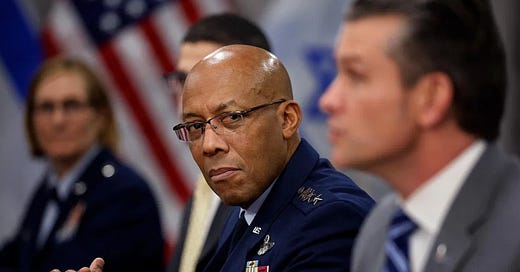



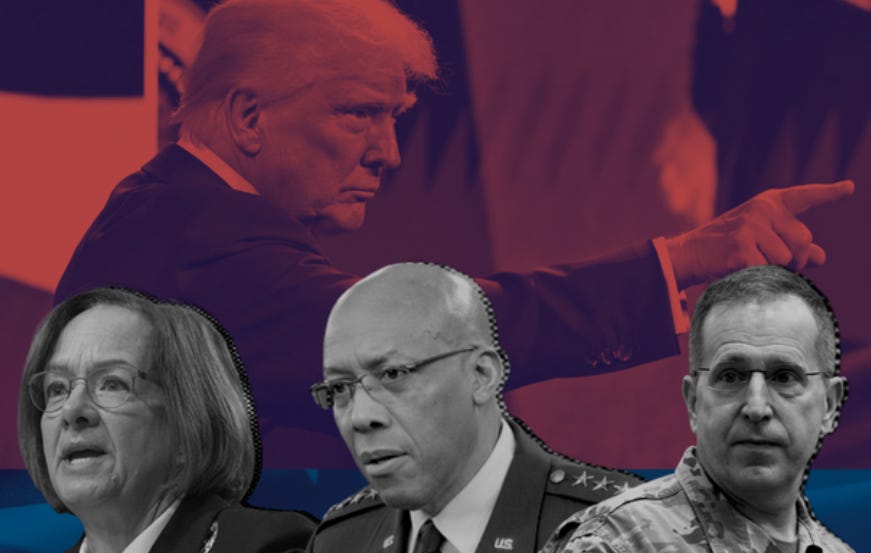




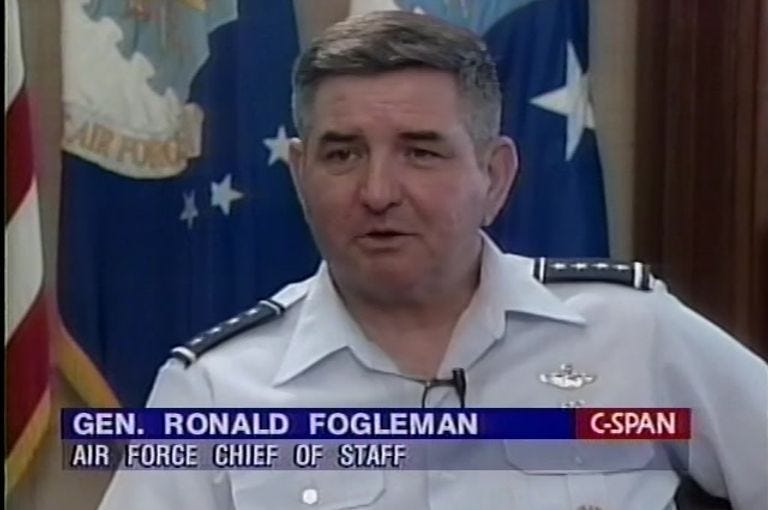
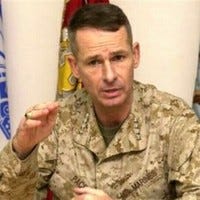
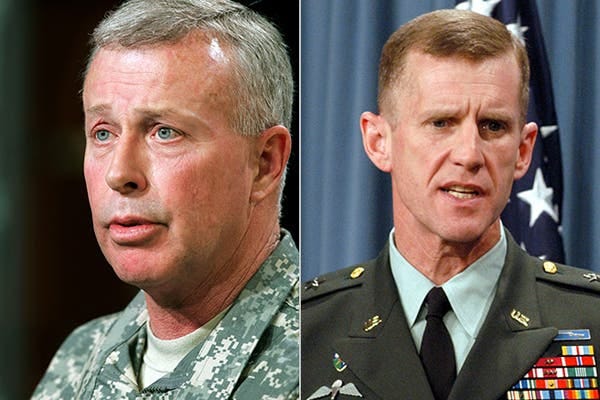

It must be hard to see low IQ commanders being retired.